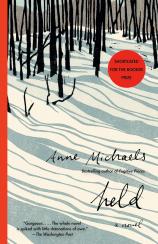Held
Review
Held
Canadian writer Anne Michaels is both a poet and a novelist, and her poetic sensibility suffuses HELD, her third novel. With its blend of fictional and real characters, its elliptical style, and a narrative structure that hopscotches across the 20th and early 21st centuries in non-chronological fashion, it’s a work that’s reminiscent of intellectually challenging ones like Olga Tokarczuk’s FLIGHTS and Maria Popova’s FIGURING. But above all, its defining characteristic is Michaels’ facility with language that she uses to paint evocative and moving scenes.
In an email interview with the CBC last year, Michaels described her aspiration for the novel: “I wanted to explore the effects over time, of our inner lives --- what is essentially invisible; how moments of comprehension, desire, transcendence, doubt, belief, the longing for meaning --- work their transformations decades later.”
"HELD is a work that’s best consumed in small bites rather than greedily devoured. It’s also one that can be revisited with pleasure, spurred by the search for connections that may have been missed on a first reading."
Michaels pursues that goal through glimpses of an assortment of characters that include a wounded English veteran of World War I and his artist wife, their granddaughter --- a physician who travels to war zones in the 1980s to work in “refugee camps, field hospitals, the most dangerous places” --- and her journalist lover, and the scientist Marie Curie and her British scientific colleague, Hertha Ayrton. The connections among these characters are suggested rather than made explicit, inviting readers to participate in the creative process by teasing them out of the narrative.
One recurring motif marries the art of photography to the subject of loss and memory. It appears early in the novel when John, with his “lame leg” and still suffering the physical and psychological effects of his involvement in the First World War’s savage trench warfare, is reunited with his wife, Helena, at their home in Yorkshire.
The couple live above John’s photography studio, where he specializes in portraits of his fellow injured soldiers. After he develops one of those pictures, he’s shocked to see a ghostly image on the print that turns out to be that of the deceased mother of his soldier subject. Michaels’ description of this remarkable event is illustrative of both her theme and her lyrical style:
“There are so many ways the dead show us they are with us. Sometimes they stay deliberately absent, in order to prove themselves by returning. Sometimes they stay close and then leave in order to prove they were with us. Sometimes they bring a stag to a graveyard, a cardinal to a fence, a song on the wireless as soon as you turn it on. Sometimes they bring a snowfall.”
And then, in a scene that takes place in France in 1910, a widow named Lia encounters a mysterious photographer in a wintry field. In their brief meeting, he observes, “You don’t need a camera to see or to remember…but you need a camera for proof of what is no longer so that others can remember.” But when Lia reflects on the loss of her late husband, she concludes that “[t]o erase someone from an image does not erase the memory of their having been in that place, does not erase the memory of that person, or that person’s memory.”
In the novel’s brief concluding chapter, set in the Gulf of Finland in 2025, Michaels returns to the theme of recollection, referring to “[t]he long fuse of memory, always alight,” and asks, “Who can say what happens when we are remembered?”
Marrying substance and style, one of Michaels’ favorite techniques involves the use of short sections featuring no more than a sentence or two of text. This one, placed between two others describing the death of one of John’s young comrades in the trench near him, is representative of her poetically influenced prose: “The shadow of the bird’s folding and unfolding, like a silk scarf in the wind, wings against the sky like the turning of a page inside out, a message passing between them.”
Enigmatic, provocative images like these, and some of the questions Michaels poses that linger in the mind like Zen kōans, combine to induce an almost meditative state while reading this book. For that reason, HELD is a work that’s best consumed in small bites rather than greedily devoured. It’s also one that can be revisited with pleasure, spurred by the search for connections that may have been missed on a first reading. Serious readers will come away from the novel challenged and refreshed by their encounter with the work of a mature, confident writer.
Reviewed by Harvey Freedenberg on February 2, 2024
Held
- Publication Date: March 4, 2025
- Genres: Fiction, Historical Fiction
- Paperback: 240 pages
- Publisher: Vintage
- ISBN-10: 0593470842
- ISBN-13: 9780593470848




